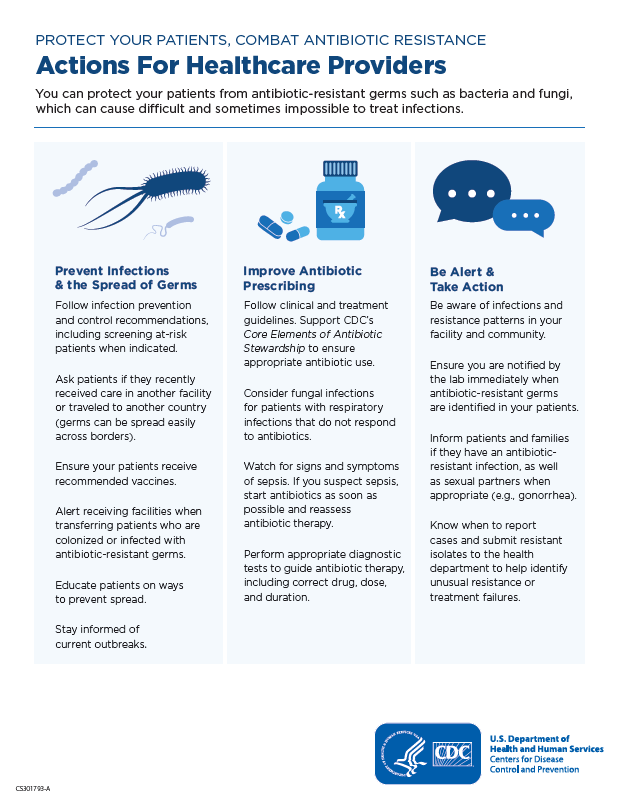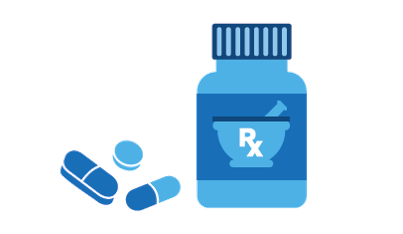Healthcare Providers: Actions to Combat Resistance

Healthcare providers play an essential role in preventing infections and stopping the spread of germs. Patients might visit your practice with an infection or can get infections when receiving health care in a facility, called healthcare-associated infections (HAIs). These infections can be caused by antimicrobial-resistant pathogens (harmful germs), which may lead to sepsis or death.
In fact, HAIs are commonly caused by antimicrobial-resistant pathogens. CDC estimated in 2019 that more than 85% of antimicrobial-resistant deaths estimated in the 2019 AR Threats Report were caused by seven antimicrobial-resistant pathogens most associated with healthcare settings:
The COVID-19 pandemic impacted antimicrobial resistance in hospitals. CDC data show that infections from healthcare-associated antimicrobial-resistant pathogens listed in its 2019 AR Threats Report increased in hospitals during 2020. Unprecedented challenges could have contributed to reduced comprehensive infection prevention and control practices, which are key to preventing antimicrobial-resistant infections and their spread. Additionally, hospitals treated sicker patients who required more frequent and longer use of medical devices like catheters and ventilators. Find out more about the impact of COVID-19 on antimicrobial resistance in the U.S.
Continue following these actions to help protect your patients and people in the community from antimicrobial-resistant infections.
Help Prevent Infections and their Spread
- Follow infection prevention and control guidelines (including screening at-risk patients when indicated):
- Ask patients if they have recently received care in another facility or traveled to another country (germs can spread easily through travel)
- Ensure your patients receive recommended vaccines, and talk to them and their families about:
- Preventing infections
- Keeping scrapes and wounds clean
- Managing chronic conditions
- Seeking medical care when an infection is not getting better
- Understanding when antibiotics and antifungals are needed
- Alert the receiving facility when transferring patients who are colonized or infected with antimicrobial-resistant pathogens, and ask colleagues to use an Inter-Facility Infection Control Transfer Form [PDF – 3 pages]
- Educate patients on ways to prevent spread of germs and infections, for example share ways to be a safe patient while in the hospital
- Stay informed of current outbreaks
Improve Antibiotic and Antifungal Prescribing
Antibiotics and antifungals save lives, but any time they are used it can cause side effects and lead to antimicrobial-resistant infections.
- Follow clinical and treatment guidelines
- Implement CDC’s Core Elements of Antibiotic Stewardship to ensure appropriate antibiotic use
- Consider fungal infections for patients with respiratory infections that do not respond to antibiotics, for example Valley fever (coccidioidomycosis), histoplasmosis, or blastomycosis
- Watch for signs and symptoms of sepsis: Clinical Resources and Guidelines
- Perform appropriate diagnostic tests to guide antibiotic and antifungals therapy, including correct drug, dose (amount), and duration (period of time)
- Optimize TB therapy: Treatment for TB Disease
Be Alert and Take Action
- Be aware of infections and resistance patterns in your facility and community
- Ensure you are notified by the lab immediately when antimicrobial-resistant pathogens are identified in your patients
- Inform patients and families if they have an antimicrobial-resistant infection, as well as sexual partners when appropriate (e.g., gonorrhea)
- Know when to report cases and submit resistant isolates to the health department to identify unusual resistance or treatment failures (e.g., report gonorrhea isolates with decreased cephalosporin susceptibility or clinical treatment failure to CDC through your state or local public health authority)



